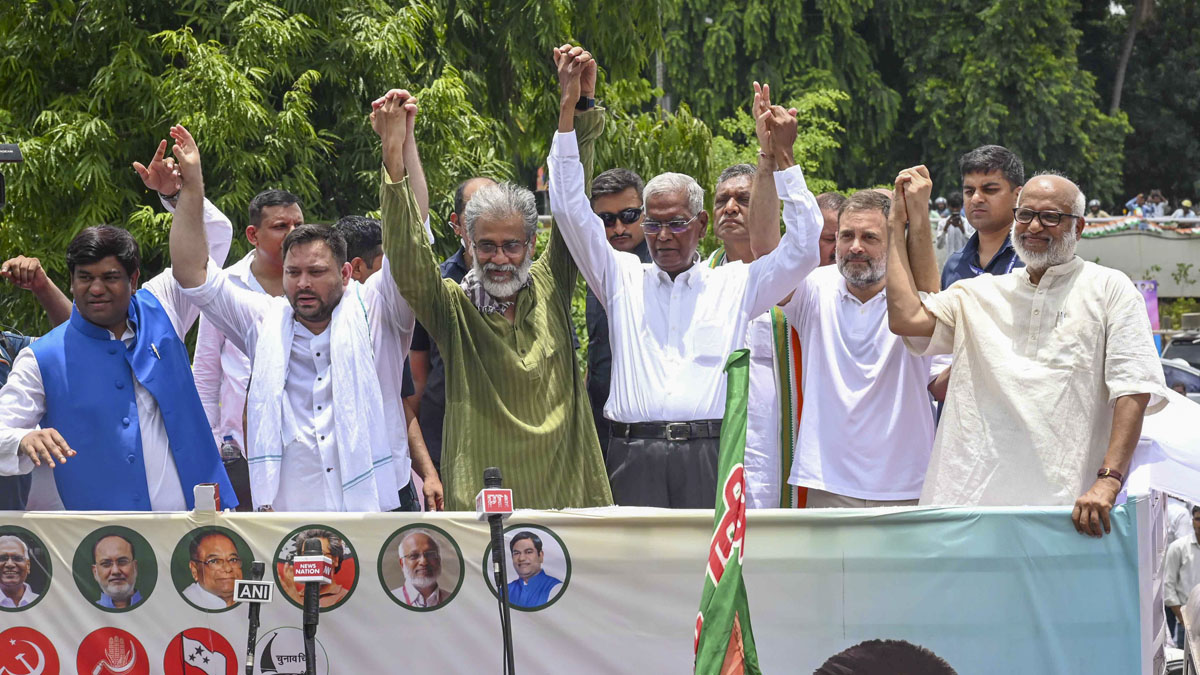Bihar polls: Will Prashant Kishor's Jan Suraaj disrupt RJD-Congress's caste-based strategy to lure traditional NDA voters?
 Patna: LoP in the Lok Sabha and Congress leader Rahul Gandhi with RJD leader Tejashwi Yadav, CPI General Secretary D Raja, CPI (ML) Liberation General Secretary Dipankar Bhattacharya and others during a press conference amid 'Bihar bandh' called by the INDIA bloc against Special Intensive Revision in the state, in Patna, Wednesday, July 9, 2025. (PTI Photo)(PTI07_09_2025_000120A)
Patna: LoP in the Lok Sabha and Congress leader Rahul Gandhi with RJD leader Tejashwi Yadav, CPI General Secretary D Raja, CPI (ML) Liberation General Secretary Dipankar Bhattacharya and others during a press conference amid 'Bihar bandh' called by the INDIA bloc against Special Intensive Revision in the state, in Patna, Wednesday, July 9, 2025. (PTI Photo)(PTI07_09_2025_000120A)
The Congress–Rashtriya Janata Dal (RJD) alliance’s backbone in Bihar has long been the Muslim–Yadav vote bank, which has supported it in overwhelming numbers. Now, after nearly two decades out of power, the Mahagathbandhan is attempting to expand its social base. The alliance is seeking to attract Kushwahas—who make up around 4–5 per cent of Bihar’s population—and Brahmins, who account for about 4 per cent. Both groups, it believes, can be decisive in several key seats.
Traditionally, the Kushwahas have backed Janata Dal (United), while Brahmins have leaned towards the BJP. However, a section within the Mahagathbandhan believes there is now a churn underway. If political realignments take shape, a small chunk of Brahmins could return to the Congress fold, while a section of Kushwahas might find greater comfort in the RJD, which is trying to project itself as an inclusive party of backward and economically weaker communities.
Party leaders feel that much will depend on candidate selection. To genuinely integrate these caste groups, the Mahagathbandhan must also reflect them in ticket distribution. A senior Congress leader said, “The Mahagathbandhan is trying hard to attract the votes of the economically backward castes and OBCs. Representation will play a key role in that effort.”
While caste arithmetic continues to dominate Bihar’s politics, this election has an additional layer of uncertainty. The new entrant, Prashant Kishor’s Jan Suraaj, has disrupted old equations by fielding candidates based on local credibility rather than caste or profession. This approach, if it resonates with voters, could fragment traditional vote banks even further, potentially altering the balance for both alliances.
Congress's Bihar unit spokesperson Asit Nath Tiwari said, "Kishor is confused with the current set of political activities happening in Bihar, and he doesn't know what equation can work. So he will just prove to be a vote cutter."
As the state prepares for a closely contested battle, both RJD and Congress are banking on micro-caste alignments and the fragmentation of the OBC vote to gain a crucial edge over the National Democratic Alliance (NDA).
Congress and the RJD are largely confident that Muslim votes will come en masse to the Mahagathbandhan, though they expect that over 10 per cent of the community’s votes may still go to the JD(U). The discontent stems from Nitish Kumar’s recent support for the Waqf Amendment Bill, which many Muslims see as a move that undermines the protection of community properties. The decision has drawn sharp criticism from minority groups and religious bodies.
Adding to this perception, Prashant Kishor has accused Nitish Kumar of betraying the very Muslims who once backed him when he was aligned with secular parties. Kishor has repeatedly said that Nitish’s frequent political shifts—particularly his return to the BJP-led NDA—have alienated a large section of his traditional Muslim supporters.
A party insider said, "Muslims may fear threat from the BJP and may not accept any other party than the Mahagathbandhan. So, we are sure they will vote for us without going anywhere else. Now, there is a churn among a few castes, Kushwahas and Brahmins, who had voted for NDA, are slowly leaning towards Mahagathbandhan. That is a very pleasing sign for the opposition camp."
India